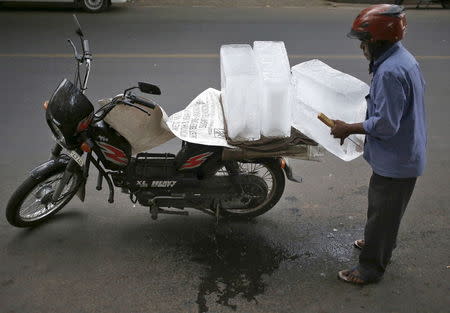Rate cut hopes wither after weak monsoon forecast
By Rafael Nam and Suvashree Choudhury MUMBAI (Reuters) - The Reserve Bank of India's new inflation mandate could stop it from lowering interest rates again this year if drought strikes, and bond yields have risen sharply on the possibility that the latest rate cut would be the last for some time. After the central bank cut rates on Tuesday for the third time this year, Governor Raghuram Rajan explicitly tied further cuts to how the annual monsoon affected food prices. On the same day, the government forecast monsoon rains -- crucial to farm output and rural incomes -- would be more than 10 percent below average, raising fears that India could suffer its first drought in six years, meaning higher food prices. Bond yields have surged more than 15 basis points since the rate cut as investors bet the central bank will be unable to the cut rates even if the economy struggles. "I expect the RBI to enter a prolonged pause in second half of 2015," said Radhika Rao, an economist at DBS in Singapore. "The RBI's monetary policy can be pro-growth only to the extent that the inflation outlook allows it," she added. Rajan fought hard to make inflation the RBI's sole mandate, and earlier this year the government and central bank agreed on a target to keep consumer inflation between 2 and 6 percent. The policy restricts Rajan's flexibility to boost growth, putting pressure on the government to nimbly handle any surge in food prices if it wants another rate cut from the central bank. The RBI on Tuesday slightly raised its projection for consumer price inflation to 6 percent in January 2016. At the current repo rate of 7.25 percent that would effectively leave real interest rates below the 1.5 percent and 2 percent the RBI has said it wants. Unpredictable monsoon rains have long bedevilled India's central bankers. Since adopting the repo rate as a main tool for interest rate policy in 2004, the RBI has never eased during the monsoon season running from mid-June to September. By contrast, the RBI has tightened monetary policy 12 times during those months - a prospect seen as unlikely this year as the economy is widely seen as struggling even as data last week showed growth overtook China in the March quarter. Analysts say the only chance of a rate cut this year would come if inflation was forecast to be within the target range for January 2016. Before the RBI policy review, analysts had expected another 25 basis points rate cut between October and December. The government can help by doing what it did last year, when it released extra stocks of rice and wheat from state warehouses and imposed caps on the stocks that could be held by traders. The government has also previously given subsidies on diesel to help farmers pump out water for irrigation. Shubhada Rao, chief economist at YES Bank said she still held hope for a rate cut, noting government action could keep inflation manageable. "While RBI will be cautious rather than gung ho in terms of rate cuts as they have made clear that the focus on inflation is non-negotiable, we expect the central bank to cut rates in the second of 2015/16 once the impact of monsoon and U.S. Fed action on inflation becomes clear," she said. (Additional reporting by Mayank Bhardwaj in DELHI; Editing by Simon Cameron-Moore)

 Yahoo Finance
Yahoo Finance 

